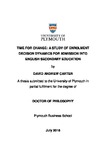Time for change: a study of enrolment decision dynamics for admission into English secondary education
| dc.contributor.supervisor | Moizer, Jonathan | |
| dc.contributor.author | Carter, David Andrew | |
| dc.contributor.other | Plymouth Business School | en_US |
| dc.date.accessioned | 2018-09-10T11:05:32Z | |
| dc.date.available | 2018-09-10T11:05:32Z | |
| dc.date.issued | 2018 | |
| dc.identifier | 751355 | en_US |
| dc.identifier.uri | http://hdl.handle.net/10026.1/12305 | |
| dc.description.abstract |
Cross-sectional studies suggest a prevalence of mental health problems from the age that children change to English secondary schools but there are few longitudinal appraisals of these issues and how enrolment policies influence psychological wellbeing. This research focuses on key factors linking competition for secondary schools and family responses to such challenges to determine enrolment policies that can sustain wellbeing longer-term. Integrated, model-based multimethodology was used in this urban, case-based study. Views were induced from multi-agency, expert practitioners to agree a system dynamics concept model. Parental decision-making behaviours were deduced by survey to understand key factors for model calibration. Dynamic system sensitivities were abduced from the simulation model before comparing long-term psychosocial impacts on children from expert, policy-support suggestions. Modelling demonstrates that two principal feedback loops influence family psychosocial systems when deciding secondary schools (parent-child wellbeing reinforcement plus knowledge of schools balancing parent concerns). Exogenous competition stressors on psychosocial systems can erode parent knowledge while testing student resolve. Competition guidance to remove risk-laden school options (league table comparison) before sequencing any remaining choices by profit (school visits), are not always used deciding urban secondary schools. Instead, families lacking experience can adopt decisive styles based on parent needs alone. Given autocratic leadership, child wellbeing rapidly deteriorates when student needs cannot be met by schools. Rather than ending student-selective entrance tests or raising knowledge of schools at visits, effective multi-agency support policy helps by increasing school choice debate frequency within families to address psychosocial system imbalances. The research makes a clear, three-way contribution to knowledge. Firstly, intrinsic case study theory is enhanced by data triangulation between induced, deduced and abduced research approaches. Secondly, the system dynamics discipline is strengthened by studying compulsory school enrolment. Finally, developing practice-based policy through multi-agency groups endorses cooperative rather than unilateral solutions, for helping change lives. | en_US |
| dc.language.iso | en | |
| dc.publisher | University of Plymouth | |
| dc.rights | CC0 1.0 Universal | * |
| dc.rights.uri | http://creativecommons.org/publicdomain/zero/1.0/ | * |
| dc.subject | System Dynamics | en_US |
| dc.subject | Multimethodology | en_US |
| dc.subject | School Choice | en_US |
| dc.subject | Enrolment | en_US |
| dc.subject | Competition | en_US |
| dc.subject | Mental Health | en_US |
| dc.subject | Referrals | en_US |
| dc.subject | Students | en_US |
| dc.subject.classification | PhD | en_US |
| dc.title | Time for change: a study of enrolment decision dynamics for admission into English secondary education | en_US |
| dc.type | Thesis | |
| plymouth.version | publishable | en_US |
| dc.identifier.doi | http://dx.doi.org/10.24382/622 | |
| dc.identifier.doi | http://dx.doi.org/10.24382/622 | |
| dc.rights.embargoperiod | No embargo | en_US |
| dc.type.qualification | Doctorate | en_US |
| rioxxterms.version | NA |
Files in this item
This item appears in the following Collection(s)
-
01 Research Theses Main Collection
Research Theses Main



